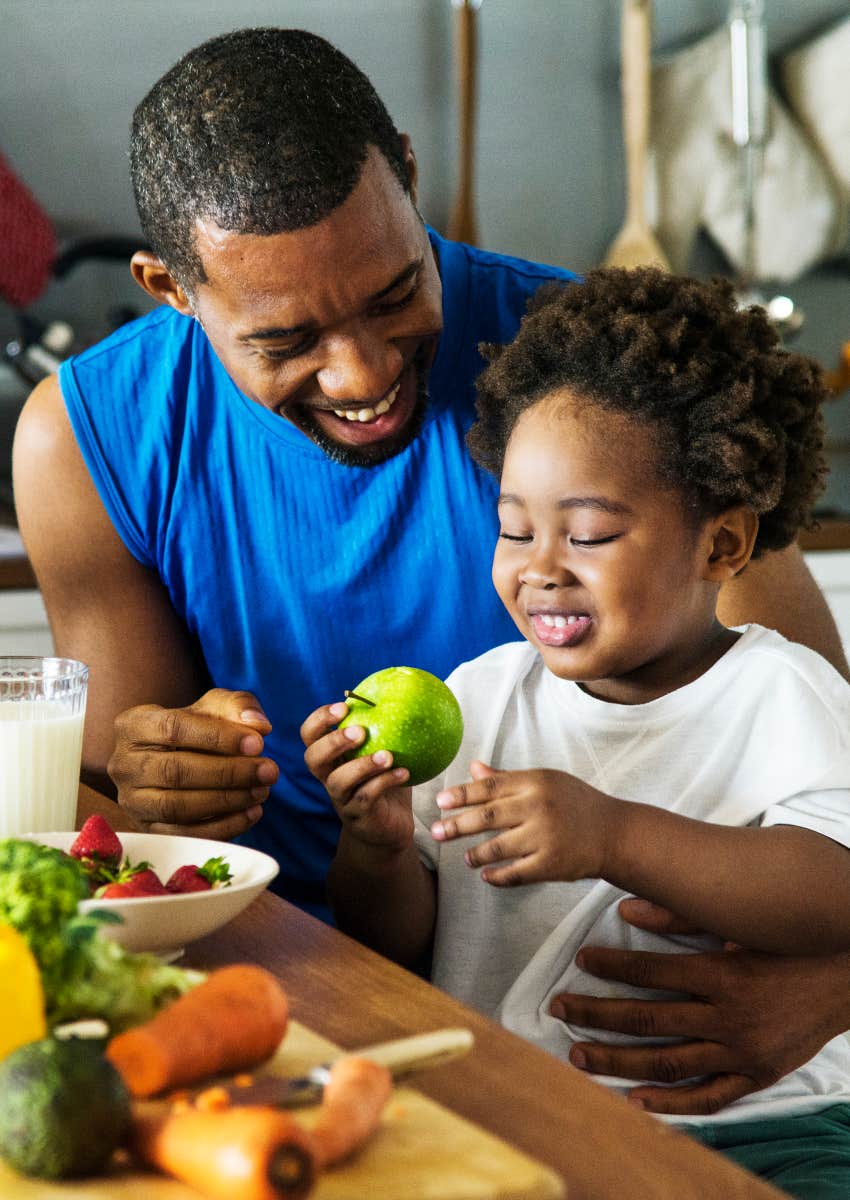Dad Tells Wife She's 'Overreacting' About His Diet Advice For Their 11-Year-Old Daughter
He may have good intentions, but he's definitely going about it the wrong way.
 dimaberlinphotos | Canva Pro
dimaberlinphotos | Canva Pro Talking to kids about food and health can be controversial in the world of parenting. Some parents prefer a more hands-off approach, letting their kids eat whatever their hearts desire, while others monitor the nutrition of every morsel.
Like with all things in life, that happy place in the middle seems to get lost in the shuffle, but unfortunately, in the case of one 11-year-old girl, she has to deal with her dad's really bad diet advice. Needless to say, Mom is worried.
The little girl's mom is understandably concerned that her husband is talking to their daughter about food in a way that is more harmful than helpful. What he thinks is advice could actually be the foothold of an unhealthy relationship with food that lasts her entire life.
One wife is wondering if she's wrong for telling her husband to stop giving their daughter diet advice.
In a recent post on Reddit, a wife questioned whether she's right to be upset about the way her husband has been talking to their daughter about her weight. She explained that their daughter is perfectly healthy for an 11-year-old, and she stays active. However, her husband is "obsessed with the idea that she'll 'get chubby like the girls at her school.'"
 Basicdog | Shutterstock
Basicdog | Shutterstock
She's overheard him multiple times telling their daughter to "skip dessert to keep her figure." He also recently advised her to only eat salads for lunch "like models do." The woman said her daughter looked extremely uncomfortable about the conversation.
When she confronted him about it and told him she thought he should stop because their daughter is only 11, he rolled his eyes and said she's overreacting and "making a big deal out of harmless advice."
Critics pointed out that this dad's 'advice' could lead to eating disorders down the road.
Many users shared their own experiences with eating disorders, and how it often starts with parents' behavior or comments. One user wrote, "My mum used to constantly tell me I'm going to get fat if I don't watch what I eat and other 'fat' comments, while simultaneously buying junk food for the house, so that's all we had. Though I wasn't at all overweight as a child. Now I'm 42 and have struggled with binge eating disorder my whole adult life which has caused severe depression and anxiety, as well as me isolating myself from having a healthy social life."
Isabel Reckson, a registered dietitian and certified diabetes care and education specialist in the Divisions of Pediatric Endocrinology and Pediatric Nephrology at Weill Cornell Medicine, explained that teaching kids to have a healthy relationship with food starts with eliminating the notion that food can be good or bad. She said, “Generally, a healthy relationship with food allows us to make choices that honor our body and our hunger without guilt. Balance and flexibility in our eating choices are paramount to that relationship, one we often need to work on and reassess throughout our lives as we grow and change.”
She went on to say, “Labeling foods as healthy vs. unhealthy can teach children that they’re doing something wrong when they eat the ‘bad’ ones. Best to refrain from talking about your diet or your dissatisfaction with your body or weight in front of your children. And try to avoid stigmatizing entire food groups by saying, for example, ‘we don’t eat carbs’ or ‘fats make you fat.’”
Other commenters pointed out the fact that this dad is bringing his daughter's classmates into the fray, as well. "I find it appalling that the husband is pitting this kid against her classmates. Seriously, 'chubby like the other girls at school?' It’s not enough to ruin his own daughter’s self-image, he’s going after her classmates too? That’s disgusting behavior from a grown man who should know better."
It's important to approach conversations about healthy eating with caution.
Even comments made with good intentions can affect the relationships kids have with food for their entire lives. Removing judgment or shame from the conversation allows children to learn about different eating lifestyles in a positive way.
 Rawpixel.com | Shutterstock
Rawpixel.com | Shutterstock
The best way to make a good impression on kids about healthy eating is to teach by example. Dianne Neumark-Sztainer, Ph.D., an author and researcher at the University of Minnesota School of Public Health, told The New York Times, "Kids eat healthier when their parents do. So exposing them to healthy food choices and being a positive role model — such as by viewing food as 'a source of joy and nourishment' rather than as an enemy can go a long way in improving their body image and their relationship with food."
It's best to avoid stressing too much about a child's body as they're developing. Children grow at different paces, and they should never be compared to other kids. If you're truly worried about their weight, talk to a pediatrician or nutritionist about helpful ways to discuss it with your kids.
Kayla Asbach is a writer currently working on her bachelor's degree at the University of Central Florida. She covers relationships, psychology, self-help, pop culture, and human interest topics.

